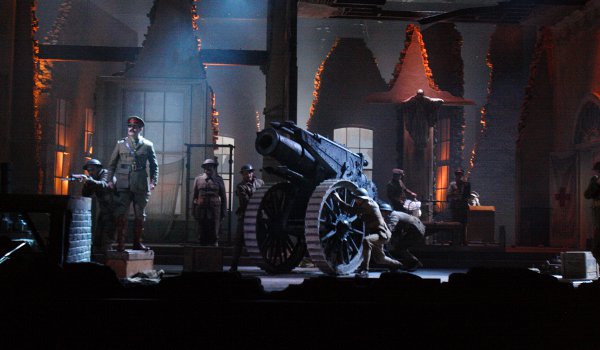The Silver Tassie
National Theatre
By Sean O’Casey
★★★★ (out of five)
THE NATIONAL’S take on Sean O’Casey’s The Silver Tassie is a feast for all the senses.
From the tantalising smell of sizzling steak on a tenement stove, to the blinding flares and choking dust of a German bombing, this forceful adaptation of O’Casey’s 1928 anti-war drama permeates every human faculty.
In the opening act, a Dublin town cheer on their boys who, led passionately by Harry Heegan (played by Ronan Raftery), are off to war.
We are then quickly transferred to France, engulfed by a sustained attack that sees the beautifully-constructed set blown to smithereens, as the World War One tale unravels.
From there we head unstoppably to the aftermath, played out in hospitals and homecomings, and at every juncture the irony of war is called up.
And although, thankfully, it’s likely to be the closest any of us will ever get to the frontline of a warzone, the National Theatre has once again managed to work its transformational magic in setting that scene.
The Lyttleton stage now effectively embodies the landscape of the First World War; from the home front to the front line and all the emotional states in between.

Director Howard Davies also brings an unexpected flair of musicality to the production, where, while possibly indulgent for some, most of act two is played out in song. It is among this musical merriment that the casualties are first introduced.
While the physically hurt are paraded on stretchers, the mentally damaged cower in the shadows, climbing ruined walls like poison ivy. Every glimpse of those tortured souls brings a renewed chill.
Admittedly throughout the four-act piece, the multi-talented - and largely Irish - cast prove themselves perfectly pitched to tell O’Casey’s tale.
Among the best of them is the magnetic duo Stephen Kennedy and Aidan McArdle, as Simon Norton and Sylvester Heegan respectively, who provide just the right amount of humour - belly laughs at times - in their marriage-like friendship.
Similarly Deirdre Mullins as Jessie Taite brings a stomping injection of sass to the production, as the put upon Dublin wife who finally gets the cream when her abusive husband returns from war blind.
But ultimately it is the cast and crew as a collective which makes this production great. It is accomplished in set, structure and sentiment and poses many all too relevant questions of war, religion and love.
Those questions linger as tangibly as the dust in our throats as the curtains fall.

